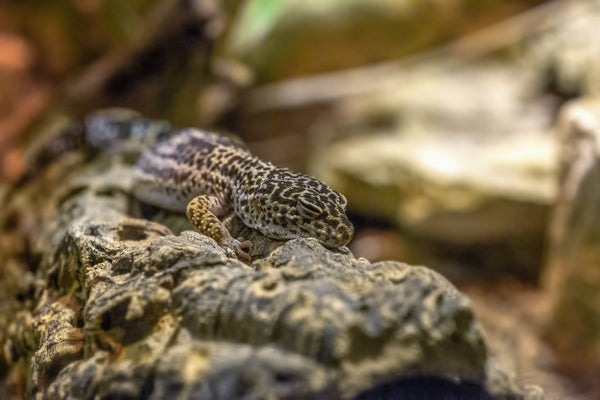Shedding Light on the Benefits of UVB Lighting for Nocturnal/Crepuscular Reptiles
While UVB lighting is commonly associated with diurnal species, its importance for nocturnal and crepuscular reptiles is frequently overlooked. Despite not being a necessity for survival in these species, providing the option for these animals to get UVB exposure can bring several benefits.
Understanding Nocturnal and Crepuscular Reptiles
Nocturnal and crepuscular reptiles, animals that are most active during dawn, dusk, and throughout the night, exhibit behaviors adapted to low-light conditions. Due to their primary active hours occurring primarily when lighting conditions are low, they rely on specialized sight to see in the dark, in combination with other senses like smell, heat, and touch to navigate their surroundings and locate prey. While they may not bask in the open sun like their diurnal counterparts, these creatures still possess physiological processes that can benefit from exposure to UVB light.
The Importance of UVB Lighting:
UVB lighting plays a crucial role in a reptile’s ability to synthesize vitamin D3, a vital nutrient responsible for calcium metabolism and bone health in reptiles. While these animals may obtain some vitamin D3 through their diet, for some, this is insufficient without additional environmental exposure to UVB rays. Inadequate levels of vitamin D3 can lead to metabolic bone disease (MBD), a debilitating condition characterized by weakened bones, deformities, and even death.
Even though nocturnal and crepuscular reptiles may not midday bask like diurnal reptiles, they still benefit from the exposure to low level UVB radiation to support their physiological processes. In the wild, these animals may receive indirect exposure to UVB rays during dawn and dusk, or through ambient light filtering through foliage. Nocturnal/crepuscular animals have been observed exposing a small amount of their body to the sunlight in a process known as “cryptic basking”. It is thought that these animals instinctively know what their bodies need to function properly, and by even exposing a small area of their body to the sunlight, they are able to reap the benefits of UV.

Benefits of UVB Lighting for Nocturnal and Crepuscular Reptiles:
1. Vitamin D3 Synthesis:
Exposure to UVB lighting allows the reptile to synthesize vitamin d3, aiding in calcium absorption, digestion, and preventing the onset of metabolic bone disease.
2. Behavioral Regulation:
Exposure to UVB lighting can help regulate the circadian rhythms of nocturnal and crepuscular reptiles, promoting natural activity patterns brought on by the presence of sunlight and reducing stress levels.
3. Reproductive Health:
Adequate levels of vitamin D3 are vital for reproductive success in reptiles. UVB lighting can contribute to the health and wellbeing of the gravid female, and has been shown to improve the calcification of reptile eggs. Reptile breeders report that offering UVB to females can reduce the toll that egg production takes on the breeding female’s body, and improves overall recovery time after laying a clutch.
4. Environmental Enrichment:
Unlike humans, reptiles are able to see UVB lighting! Imagine how much more interesting an environment can be with the presence of an entirely new visual spectrum of light. Providing UVB creates a more dynamic and stimulating habitat for these animals in captivity.
While UVB lighting may not be a strict requirement for the survival of nocturnal and crepuscular reptiles in captivity, it has many benefits to their health and well-being that should not be underestimated. Providing UVB lighting in captivity helps simulate natural conditions, supports essential physiological processes, and contributes to the overall quality of life for these amazing creatures. By understanding and addressing the specific needs of nocturnal and crepuscular reptiles, we can help them thrive in captivity and foster a deeper level of care and understanding for the animals we care for.
Providing the correct level of UV output at proper distance is paramount for the safety of your reptile. Always research the ideal conditions for the species you are caring for before offering UVB.
To learn more about reptile lighting, husbandry, and more check out our other articles here!




















